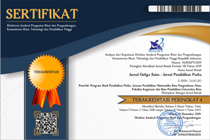Implementation of PhET Virtual Laboratory Media-Based Physics Learning on The Progress of Student Concept Mastery During the Covid-19 Pandemic
Abstract
This research aims to analyze the progress of mastery of the concept of Work & Energy and the concept of Dynamic Electricity with the application of media-based learning in the Virtual PhET laboratory. This type of research uses descriptive research to describe the object studied against the sample, namely students of the physics education study program, FKIP University of Cenderawasih. Collecting research data using a concept mastery test instrument given at the end of the lecture through a written essay test with 9 questions. This test is given to determine the mastery of students' concepts after taking lessons on the concepts of Work & Energy, and Dynamic Electricity. The test result data were analyzed based on the student's concept mastery assessment score. The results of the research obtained for concepts 1 and 2 mostly obtained very good and good categories of 63.50%, sufficient percentage category of 12.00%, and less and very poor categories of 21.00%. Therefore, the application of learning concept 1 and concept 2 based on the Virtual PhET laboratory media during the covid-19 pandemic for Cendrawasih University physics education students progressed to better mastery of concepts with the largest gains in the good and very good categories.
Keywords
Full Text:
PDF (Bahasa Indonesia)References
Asmawati, E. Y. (2015). Lembar Kerja Siswa (LKS) Menggunakan Model Guided Inquiry untuk Meningkatkan Keterampilan Berpikir Kritis dan Penguasaan Konsep Siswa. Jurnal Pendidikan Fisika, 3(1), 1-16.
Djaali, H., & Muljono, P. (2008). Pengukuran dalam bidang pendidikan. Jakarta: Grasindo.
Jannah, A. N., Yuliati, L., & Parno. (2016). Penguasaan konsep dan kemampuan bertanya siswa pada materi hukum newton melalui pembelajaran Inquiry Lesson dengan strategi LBQ.
Makarim, N. A. (2020). Panduan Penyelenggaraan Pembelajaran pada Tahun Ajaran dan Tahun Akademik. Retrieved from SIARAN PERS Nomor: 137/sipres/A6/VI/2020: https://www.kemendikbud.go.id
Martanti N., Malika E. R., & Setyaningsih. (2014). Pengaruh Metode Pembelajaran Eksperimen Virtual Menggunakan PhET Terhadap Hasil Belajar Kognitif Siswa. Jurnal Konvergensi Teknologi dan Sistem Informasi, XX, 65-75.
Maulana, A. I., & Sari, S. S. (2018). Penerapan Perangkat Pembelajaran Berbasis Laboratorium Virtual Pada Pencapaian Hasil Belajar Fisika Peserta Didik Kelas XI MIA 5 SMA 15 Makassar. Jurnal Sains dan Pendidikan Fisika (JSPF), 14(1), 16-22.
Mubarrok, M. F. (2014). Penerapan Pembelajaran Fisika pada Materi Cahaya dengan Media PhET Simulations untuk Meningkatkan Pemahaman Konsep Siswa Di SMP. Jurnal Inovasi Pendidikan Fisika, 3(1), 76-80.
Novrizal, F. (2010). Pengaruh Model Pembelajaran Sains Teknologi Masyarakat Terhadap Peningkatan Penguasaan Konsep Fisika pada Konsep Usaha dan Energi. Retrieved Januari 23, 2018, from repository uinjkt: http:// repository.uinjkt.ac.id
Prihatiningtyas, S., Prastowo, T., & Jatmiko B. (2013). Implementasi Simulasi Phet Dan Kit Sederhana Untuk Mengajarkan Keterampilan Psikomotor Siswa Pada Pokok Bahasan Alat Optik. Jurnal Pendidikan IPA Indonesia, 2(1), 18-22.
Razi, P. (2013). Hubungan Motivasi Dengan Kerja Ilmiah Siswa Dalam Pembelajaran Fisika Menggunakan Virtual Laboratory Di Kelas X SMAN Kota Padang. Jurnal Teknologi Informasi & Pendidikan, 119-124.
Saputra, R., Susilawati, S., & Verawati, N.N.S.P. (2020). Pengaruh Penggunaan Media Simulasi Phet (Physics Education Technology) Terhadap Hasil Belajar Fisika. Jurnal Pijar MIPA, 15(2), 110-118. doi: 10.29303/jpm.v15i2.1459
Sinulingga P., Hartanto, T. J., & Santoso, B. (2016). Implementasi Pembelajaran Fisika Berbantuan Media Simulasi PhET untuk Meningkatkan Hasil Belajar Siswa pada Materi Listrik Dinamis. Jurnal Penelitian dan Pengembangan Pendidikan Fisika, 2(1), 57-64.
DOI: doi.org/10.21.009/1.02109
Siti Chodijah, Fauzi, A., & Ratnawulan. (2012). Pengembangan Perangkat mbelajaran Fisika Menggunakan Model Guided Inquiry yang Dilengkapi Penilaian Portofolio pada Materi Gerak Melingkar. Jurnal Penelitian Pembelajaran Fisika,1(1), 1-19.
Suana, W. (2017). Pengembangan Perangkat Pembelajaran Listrik Dinamis Berbasis Virtual Experiment Untuk Kuliah Teori Dan Praktikum Terintegrasi . Jurnal Pendidikan Fisika (JPF) Universitas Muhammdiyah Metro, 5(1), 46-61.
Sumarauw, J. M., Ibrahim, M., & Prastowo, T. (2017). Pengembangan Perangkat Pembelajaran Berbasis Inkuiri Ter-bimbing Berbantuan Simulasi PhET dalam Pembelajaran IPA. Jurnal Penelitian Pendidikan, 34(1), pp. 25–36. doi: 10.15294/jpp.v34i1.10909
Yulia, I., Connie, C., & Risdianto, E. (2018). Pengembangan LKPD Berbasis Inquiry Berbantuan Simulasi Phet untuk Meningkatkan Penguasaan Konsep Gelombang Cahaya di Kelas XI MIPA SMAN 2 Kota Bengkulu. Jurnal Kumparan Fisika, 1(3), pp. 64–70, 2018. doi: 10.33369/jkf
Zahara S., Yusrizal, Y., & Rahwanto, A. (2015). Pengaruh Penggunaan Media Komputer Berbasis Simulasi Physics Education Technology (PhET) Terhadap Hasil Belajar Dan Keterampilan Berfikir Kritis Siswa pada Materi Fluida Statis. Jurnal Pendidikan Sains Indonesia, 3(1), 251-258.
DOI: http://dx.doi.org/10.31258/jgs.9.2.123-128
Refbacks
- There are currently no refbacks.
Copyright (c) 2022 Florentina Maria Panda, Bonefasius Yanwar Boy

This work is licensed under a Creative Commons Attribution 4.0 International License.
Jurnal ini terdaftar dan terindeks pada:
- Crossref
- Google Scholar
- Crossref
- Garuda
- Sinta
- Researchgate
- Dimensions
- Base
- Scilit
- OneSearch
- Road
- CiteFactor
- ResearchBib
- WorldCat



















